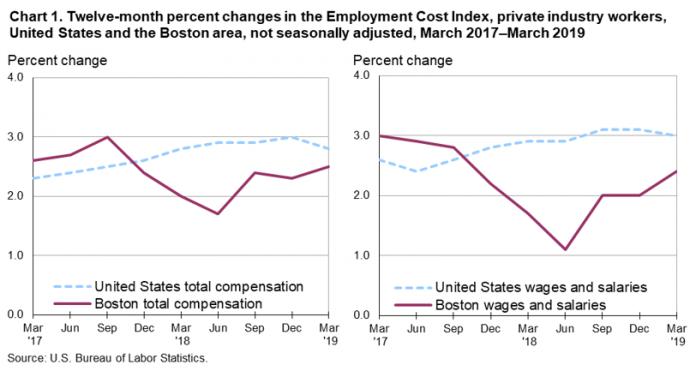
PROVIDENCE – Total compensation costs for private industry workers in the Boston-Worcester-Providence, Mass.-R.I.-N.H.-Conn., Consolidated Statistical Area increased a nonseasonally-adjusted 2.5% year over year in March, according to the U.S. Bureau of Labor Statistics Monday. The report also found that the area experienced a 2.4% increase in wages and salaries for private industry workers in that time. The measured area includes all of Rhode Island and Bristol County, Mass.
One year prior, private industry workers compensation costs in the area increased at a 2% rate, while wages and salaries saw a 1.7% increase.
Nationally, compensation costs increased at a 2.8% rate year over year in March while wages and salaries increased 3%. In the Northeast, compensation costs were reported to have increased at a 3.3% rate while wages increased at a 3.1% rate year over year.
Of the 15 CSAs included in the report, the New York-Newark, N.Y.-N.J.-Conn.-Pa., area had the largest year-over-year increase in total compensation in March at 3.9%. The only year-over-year compensation cost decline in the Seattle area, where costs declined 0.2%.
The Los Angeles-Long Beach CSA had the largest wage and salary increase in that time, growing 4.5% over the year. The lowest wage and salary growth of the 15 areas in the report was in the Houston metro area at 1.4% from March 2017 to March 2018.
The BLS said that report is a measure of the cost of labor in major metropolitan areas that is free from the influence of employment shifts among occupations and industries. Total compensation includes changes in wages and salaries, and employer costs for employee benefits.
Chris Bergenheim is the PBN web editor. He can be reached at Bergenheim@PBN.com.












